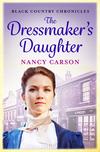Kitabı oxu: «Daisy’s Betrayal»
NANCY CARSON
Daisy’s Betrayal

Copyright
Published by Avon
An imprint of HarperCollinsPublishers Ltd
1 London Bridge Street
London SE1 9GF
First published in Great Britain by HarperCollins 2016
Copyright © Nancy Carson 2016
Cover illustration © Debbie Clement 2016
Nancy Carson asserts the moral right to be identified as the author of this work.
A catalogue copy of this book is available from the British Library.
This novel is entirely a work of fiction. The names, characters and incidents portrayed in it are the work of the author’s imagination. Any resemblance to actual persons, living or dead, events or localities is entirely coincidental.
All rights reserved under International and Pan-American Copyright Conventions. By payment of the required fees, you have been granted the non-exclusive, non-transferable right to access and read the text of this e-book on screen. No part of this text may be reproduced, transmitted, down-loaded, decompiled, reverse engineered, or stored in or introduced into any information storage and retrieval system, in any form or by any means, whether electronic or mechanical, now known or hereinafter invented, without the express written permission of HarperCollins.
Source ISBN: 9780008166908
Ebook Edition © May 2016 ISBN: 9780008134853
Version: 2017-11-13
Table of Contents
Cover
Title Page
Copyright
Chapter 1
Chapter 2
Chapter 3
Chapter 4
Chapter 5
Chapter 6
Chapter 7
Chapter 8
Chapter 9
Chapter 10
Chapter 11
Chapter 12
Chapter 13
Chapter 14
Chapter 15
Chapter 16
Chapter 17
Chapter 18
Chapter 19
Chapter 20
Chapter 21
Chapter 22
Chapter 23
Chapter 24
Chapter 25
Chapter 26
Chapter 27
Chapter 28
Chapter 29
Chapter 30
Chapter 31
Chapter 32
Chapter 33
About the Author
Advert
By the Same Author
About the Publisher
Chapter 1
Daisy Drake had always been able to summon up a picture of the man she might eventually marry. Apart from the essential virtues of being tall, lean, excessively handsome, kind and, of course, gentile, he would be reasonably well off and never inhibited about showing his affection – even in public. He would also be a patient man; patient not only with her but with her family as well. Such high marital expectations for a lowly working-class girl like Daisy might have been unrealistically optimistic, but her self-esteem was high and she never doubted that such a man existed and would eventually emerge through the Black Country’s industrial murk. By the time she was twenty-two however, her imagined bridegroom still had not shown up and the thought had already crossed her mind that maybe she was destined to be an old maid.
Daisy was born in Dudley in Worcestershire on 18th May 1866 to Mary and Titus Drake. Mary had wanted the baby named after her own mother, Rhiain who was Welsh, but Titus would have no further truck with anything that came out of Wales. Better to call his new daughter after his own mother, Hannah. After some spirited – but never serious –arguments when Welsh and English forebears had been equally disparaged, they settled on neither, and Daisy emerged as the favourite. ‘There’s ne’er another wench like thee, our Daisy, yo’m a one-off,’ he used to tell the little girl proudly in his dense Black Country accent, tousling the dark ringlets that hung down her neck in thick coils. It irritated her to death but she loved him, and he loved her; small, wiry Titus Drake, iron puddler.
Titus told his young daughter casually that while he was at work, sweating over a searing hot hearth, puddling iron, he could sink eighteen pints of beer on a hot summer’s day.
‘Eighteen pints?’ Daisy queried, wide-eyed with incredulity.
‘Eighteen pints and I never get sozzled! We sweat it out, see. All the blokes drink like fish, working in that heat. The gaffers gi’ it us free. We even have a beer boy to keep we topped up.’
‘Why don’t you drink water, Father?’
‘Drink wairter? You couldn’t drink the wairter, my angel. You wouldn’t dare drink the wairter. It’d gi’ yer the ballyache and the squits. Yo’d be off th’ooks for days and lose time at work.’
From the point of view of other folks Titus Drake was nobody special, just an unskilled ironworker. To Daisy, though, he was everything. On Saturday afternoons he would say, ‘Come on, our bab, we’m off somewheer,’ and he would take her over the Oakham woodland, known as the Dingle, and show her the bluebells in spring; they were so dense you couldn’t walk anywhere without treading on them. In the autumn, they would take a basket and gather mushrooms and make mushroom soup when they returned home. Everything they saw, every bird, every nervous animal, every swaying flower, every gnarled tree, he had something to say about and made it all so interesting and vivid. Life was always exciting. There was so much to see, so much to learn about. Once, they gathered blackberries to make wine and, when they returned home with baskets full, he asked Daisy to help him make it.
‘Pour the sugar in now, my wench,’ he said stirring the must.
Unfortunately, washing soda came in blue bags identical to those the sugar was packed in and … Well, it was an easy mistake … But together they just laughed and laughed.
‘What’s your earliest memory, our Daisy?’ Titus asked one day, on another blackberry harvesting when she was a little older.
‘Oh, walking with Mother to take you a basin of broth for your dinner.’ She stooped to reach a cluster of blackberries she’d just spied. ‘I remember toddling beside her for miles, holding her hand, on our way to you at the Woodside Ironworks.’ She looked up at him and smiled. ‘We seemed to have been walking forever.’
‘Oh, it’s a tidy walk I grant yer, our Daisy. I hoof it there and back every day, bar Sundays.’
‘Yes, but you’re used to it. I wasn’t. I was only little. I was that thankful when we stopped.’ She dropped a handful of blackberries into her basket. ‘My little legs seemed so heavy and my poor feet ached. Then all I heard was this terrible roar from inside the factory. It frightened me to death. That, and the clanging of iron and the noise from the steam engines …’ She stood up to stretch her legs. ‘I can even remember the stink. It caught at the back of my throat. I don’t know how you could stand it. It can’t have done your health any good … Anyway, before Mother handed over your basin, you scooped me up in your arms and hugged me. Reuben Danks was with you and you showed me off to him and made me say hello and I was all shy.’
‘I remember. And Reuben said, “Titus, yo’ll have to watch her when her’s a young madam – her’ll be a bobbydazzler and no two ways.” And he was right.’
Daisy laughed contentedly.
She also remembered the smell that clung to her father that far-off day, though she did not mention it. It was the sharp aroma of iron and oil and smoke and sweat, all mixed together in some malodorous blend. Yet it was beyond her to actually dislike it, simply because it was his smell, the smell he always carried with him when he came home.
She licked the blood-red blackberry juice that was dribbling between her fingers. ‘Something else I remember …’ She looked at him with all her love in her eyes. ‘You giving me donkey rides on your back as well. You used to run about the backyard like a frightened pig escaping from the slaughterman, while I screamed and Mother begged you to be careful lest I fell off and broke my neck.’ She chuckled at the memory.
They were not well off, but neither were they poor. Titus Drake earned regular money, sufficient to live on, and he turned it up; he drank only moderately outside of work. They always ate good, nourishing food that Mary Drake cooked in the oven of the black-leaded grate that she cleaned conscientiously until it looked like polished melanite. No neighbour could ever tittle-tattle that Mary wasn’t clean. Bacon and pork was plentiful, for they kept pigs in those days. Sometimes they’d be given a rabbit or wring the neck of one of the plump chickens that strutted round the yard. They also ate the other things that Black Country families ate; chitterlings, liver faggots with grey peas, lambs’ brains with egg, pigs’ trotters and grawty pudding. They never went short.
Even at the age of five, it struck Daisy that her mother, unlike other women she knew, was not having any babies. Naturally enough, she was not familiar with the arcane secrets of conception, so it never occurred to her that her father might also have something to do with it. Babies, she had the distinct notion, came from a woman’s belly or bottom somehow, but none were coming from her mother’s. Friends who were the same age as Daisy all had at least one brother or sister to play with, and often more. Some even had nine or ten. Why did she not have a brother or sister? Just one would do. It wasn’t fair. Then, one day in October 1874, when Daisy was eight years old, Mary Drake announced that she was going upstairs to have a baby. A few hours later Sarah was born, all red-faced and puckered. Daisy was bitterly disappointed at the sight of her. She had expected to see a pretty baby that would gurgle at her, hale and hearty with plump rosy cheeks and wide blue eyes that would smile appealingly. All she beheld was this ugly, hairless little bundle of wrinkled flesh that struggled to make any sound at all – even when she cried – and slept the rest of the time. Sarah was a disappointment at first, but Daisy loved her all the same.
Nevertheless, that ugly little bundle showed early signs of growing into a beautiful princess. When she was five and Daisy was thirteen, Sarah had the most engaging blue eyes, the prettiest little nose and delicious rosebud lips. Daisy loved to press her cheek against Sarah’s and feel the incredibly warm infant smoothness against her own face. It was obvious even then, that given time, all the lads would be chasing her. Already, boys of seven and eight would call for her to come out to play.
Not only Titus, but Mary too, was a great influence on Daisy as a young girl. Mary was small in stature, slender, and had a natural grace that folk reckoned Daisy had inherited. Although she was from a poor family, she kept a good house and ensured that everything her daughters did was done properly; a discipline Mary had learnt from her days as a servant in a big house in Pensnett. Early on in her daughters’ lives, Mary had the foresight to take out a small insurance policy for each in turn, in readiness for the day when they too would enter domestic service and have to pay for their uniforms. She insisted that they go to church every Sunday morning and evening. Because they dwelt opposite the glassworks in Campbell Street, in the parish of St Thomas, they attended Top Church, as it was known. Standing majestically at the top of the town, Top Church was the tallest building for miles with its tapering steeple pointing high into the sky. You could see it piercing the skyline like a saddler’s needle from a long way off. It was a great landmark, almost as great as the Norman castle that dominated the other end of the town.
Another good influence on Daisy was Miss Payne, her schoolmistress at St Thomas’s School. Alice Payne taught her common sense and how to do complicated sums. She taught her to read and write, to appreciate the more cultured aspects of life, and vigorously discouraged her from speaking with a broad Black Country accent, correcting her at every slip. Miss Payne’s influence stayed with Daisy.
Daisy’s best friend in those days was Emily Tucker who went to work in service at the house of Mr Charles Ralph Spencer, a highly respected solicitor. He regularly attended Top Church.
‘Guess what,’ Emily whispered to Daisy at a moment when the point of Reverend Cosens’s sermon was particularly elusive. ‘There’s a position to be had at Mr Spencer’s. They’m after a maid. Why don’t you apply?’
‘Me?’
‘Tha’s what you wanna do, in’t it? Work in service?’
Daisy shrugged. ‘Yes.’
‘So ask about it. Mr Spencer’s in church. Ask him about it after.’
Emily was older than Daisy and far more sensible, Daisy thought. After fretting all through Matins and taking furtive peeps at the lordly Mr Spencer, to try and judge just how approachable he was, Daisy finally managed to pluck up the courage to address him after the service as he and his wife were leaving.
‘Excuse me, Mr Spencer,’ she said apologetically, running beside them down the stone steps that spilled onto High Street. ‘My friend Emily Tucker says you have a vacancy for a maid. I … I wondered if you would consider me?’
Mr Spencer’s initial expression was one of disbelief that any girl as young and insignificant as Daisy could have the brazen audacity to confront him on God’s day of rest. But he got over his shock and smiled at her patiently and rather politely, considering her lowliness.
‘Your name, Miss?’
‘Daisy Drake, sir.’
‘One of our regular congregation,’ Mrs Spencer, who was holding his arm, informed him pleasantly.
‘Of course, I know your face,’ he said with an agreeable smile. ‘Well … How old are you, Miss Drake?’
‘Thirteen, sir,’ Daisy answered, blushing as she realised just how forward she must have seemed. ‘Thirteen in May.’
‘Do you know where I live?’
‘Yes, sir. On Wellington Road, sir. I know just where it is.’
‘Come and see my wife at half past four tomorrow afternoon … and don’t forget to bring your character.’
As he and Mrs Spencer left, Daisy looked at Emily with open-mouthed disbelief and chuckled at her own audacity.
‘There you am,’ Emily said. ‘Easy. Yo’ll get that job and no mistek.’
‘But who’ll give me a character?’
‘Ask the vicar.’
It was July 1879 and since Daisy was just about to leave school, the timing could not have been better, for she was given the job, as Emily had predicted. Although she was thrilled, she was naturally sorry to leave her mother and father and little Sarah in that modest terraced house of theirs. Her mother was so proud, however. She cashed in her older daughter’s insurance policy, bought her uniform and off Daisy went to work. For many a young girl, leaving home to live and work in a strange house was a lonely and depressing experience. Daisy was lucky; she knew Emily. Otherwise, for a time, she might have been lonely even though Mr Spencer was very kind to his staff. She had Sunday afternoons off, when she would visit her family, one night off every week besides, and she was promised two weeks’ holiday a year. In addition, she was to be paid an annual salary of £10, most of which she hoped to give to her mother.
Daisy and Emily joined the St Thomas’s Girls’ Friendly Society which they attended on their night off. It provided social and religious activities and sewing. They bought material at half the price it was offered in the town shops and a lady came in and taught them how to cut it and sew it, so they could make dresses and other garments. There were Bible readings from Reverend Cosens, beetle drives, and Daisy made friends with some lovely girls, though not all were in service. She felt a great affinity to that sisterhood of young women who taught her so much, not just about sewing either, but about life.
She settled well into working at the Spencer household and enjoyed it. Once, she was taken ill with flu and Mr Spencer paid the doctor to come and see her, then allowed her home for a week afterwards to convalesce. Yet, despite his kindness and commendable charitableness, he docked her a week’s money.
In the summer of 1882 when she was sixteen, Daisy realised that the baker’s boy was taking an interest in her. Charlie Bills was a good-looking lad with a cheeky grin and she’d secretly been admiring him for some time. One day, when he was delivering, he asked to see her on her night off.
‘But I go with Emily to the Girls’ Friendly Society at Top Church on my night off,’ she told him disappointedly.
‘I could meet yer after and walk yer back.’
Her heart started hammering hard at the prospect. ‘All right,’ she agreed with a smile, and the tryst was arranged.
When that eagerly anticipated time came she bid Emily goodnight and Charlie whisked her away.
‘Want to see a wasp’s nest?’ he asked boyishly.
‘Not particularly.’ Daisy was not impressed. The thought of being attacked by a million of the humming little devils terrified her.
Yet despite a poor start, Charlie Bills became her first sweetheart. He harboured some exalted plans: he was going to start his own bakery and marry her. They would live in a fine house on Ednam Road, have several children and a top floor full of servants. He was a dreamer and Daisy took all this in like the immature young girl that she was. Charlie never once considered the difficulties, the sacrifices. To start a bakery business he first needed money. Then he would have to work all the hours that God sent, getting up at two or three in the morning to bake bread ready for his first customers who wanted it before their husbands scurried off to work. Once Daisy realised this, she decided she didn’t fancy the life of a baker’s wife.
When you are sixteen and in love, your emotions boil over. They run away with you. Thus it was with Daisy. She was besotted, early on at least. Sometimes, when Charlie called to deliver the bread, she would contrive to be in the laundry and he would come and furtively seek her out. He would take her in his arms, press her against the mangle or the stone sink, and she would feel all swoony with pleasure when he kissed her. She could always smell fresh-baked bread on him, a smell she adored. Of course, she never allowed him to go any further than kissing … except for the few occasions after they got to know each other better, when she allowed him to feel her breasts, but only ever over her bodice, never underneath. After all, she went to church regularly, she was a regular member of the Girls’ Friendly Society and they were always warned about what happened to silly girls who allowed boys to take liberties; well, the workhouse was full of unfortunate examples. Yet, when she sat daydreaming, the thought of having her breasts fondled in the flesh, imagining what his lips might feel like nuzzling her nipples, was decidedly appealing. When Charlie kissed her on the lips she would feel her breathing coming harder and faster, and was surprised at her own physical reactions.
On summer evenings, on her nights off, they would sit among the limestone ruins of the old St James’s Priory. Once, while Charlie was idly poking the ground with a stick, they found some tiles embedded in the dirt and moss, laid originally by the monks that had built the place centuries ago. The tiles had strange, beautiful patterns on them and must have been five hundred years old or more but, at the time, that meant nothing to her. When she went back years later, those old tiles were still there. Then, she could see how beautiful they were, and could appreciate the time and skill that was required to make them and fire them in those long-gone days.
Charlie and Daisy courted for about two years. He was always talking about getting married but she knew, even then, that he would never measure up to her notions. When she was eighteen, he asked her seriously to become his wife and she said no – politely, of course. He became resentful at being rejected and told her one day, when he delivered the Spencers’ bread, that he had started seeing somebody else. Daisy was hurt and disappointed but not heartbroken. After that she didn’t bother with boys. Those she met all seemed too silly and only interested in one thing, which she, having been tutored by the Girls’ Friendly Society, was certainly not prepared to give.
It became manifestly obvious that boys were interested in her by this time. With good reason. She had a shock of dark hair that she wore elegantly pinned up at work and when she went out. When she let it down at bedtime, it cascaded down her back like a silky, shiny mane. She had a lovely round face, with high cheekbones. Her blue eyes were big and bright, slightly slanted, with long lashes that swept her cheek as she fluttered them playfully whenever she chose to flirt with those lads that showed an interest. She had inherited her mother’s slenderness and grace and was exquisitely constructed. Her skin was an appealing pale olive, smooth and utterly flawless. And, in the same way that a fat person knows when she is fat, or an ugly person knows when she is ugly, Daisy knew she was a thoroughly good-looking young woman with as good a figure as she’d ever seen. Furthermore, she always tried to make the best of herself in a proper, demure way.
Daisy progressed well in the Spencer household. She did every job that was given her, without resentment or complaint and always to the best of her ability. Fire grates had to be cleaned, including a six-foot range in the kitchen that had to be blackleaded. Fires had to be lit, candlesticks and lamp glasses cleaned. All the water-jugs, basins and chamber pots in the house had to be emptied, carefully washed and scalded if necessary. Windows had to be shone. Each week every bedroom had to be cleaned from top to bottom, so there were mattresses to be turned and brushed, pillows shaken and smoothed and, naturally, no dust was allowed to remain under any of the beds. Curtains had to be shaken, brass curtain rods burnished bright, paintwork washed, looking glasses polished and floors buffed. She had to keep a sharp look out for insects and bed bugs, which could enter the house on visitors who had travelled by train or hackney carriage. All hell would be let loose at the discovery of a bed bug.
About a year after Charlie decided he was wasting his time with Daisy, her father fell ill. It started with gout in his right foot; all that beer, Mary said. Mary accidentally knocked his gouty foot once and he called her all the names under the sun. From that day on, he sat in his armchair with his foot in a wicker clothes basket for protection, with a soft cushion to afford some damping if ever it was knocked again. To top it all, he had an abscess up his backside as well. It did not stop him breaking wind, though. ‘Abscess makes the fart go yonder,’ he remarked on one such turbulent occasion – despite his acute discomfort, he retained his dry Black Country sense of humour. He had about three months off work and then, as he was about to return, his gout and his abscess having retreated, he began complaining about his chest. He was having difficulty breathing and was having night sweats.
Mary sent for Dr McCaskie and it was evident he was worried about poor Titus. He promised to keep an eye on him, said that he must rest and not go to work. Daisy was desperate to help and handed over all her wages to her mother, arguing that she needed very little herself since she ate heartily and slept at the home of Mr Spencer. Already she had saved up and bought another uniform, and had made a couple of decent frocks besides for going out in. She was earning £12 a year by this time, not a fortune and certainly not enough to keep her family.
Of course, the Spencers were not so well off that Mrs Spencer had a lady’s maid, so Daisy carried hot water upstairs so they could wash. She worked in the kitchen with the cook and got to know her routine. By the time she was twenty, she was the head maid and earning £15 a year.
Meanwhile, Titus got no better and had to give up work entirely. He was beginning to lose weight, which he could ill afford to do. Mary applied for parish relief. It was always a struggle to find money for coal, for rent and for food. Daisy tried to borrow money to pay the doctor to treat her father, but realised she had no chance of paying it back, so gave up the idea.
Sarah, by this time had, left school and found work in service. Unfortunately, the family she worked for were not kind to her and she hated her job. Yet she stuck it out, concerned only that she give money to her mother to help keep them.
They all struggled through for a couple of years. Dr McCaskie was sent for again and he warned that Titus might be consumptive. Then, Daisy had a spot of good fortune. Again, through somebody she had got to know at church, she was asked if she would be interested in the position of housekeeper at a place called Baxter House on the rural north-western side of Dudley. The house was named after Richard Baxter, a long-departed headmaster at the grammar school, famed for having written the words to the hymn, ‘Ye Holy Angels Bright’. Baxter House was the home of Mr Jeremiah Cookson. Daisy had seen Mr Cookson before, as he was a business friend of Mr Spencer. She had also occasionally spoken to his wife in the course of her duties, as the couple were visitors to the Spencer household. Her wages were to be £60 a year, a goodly amount. Daisy found it impossible to resist when she realised how much easier it would be to help support her mother and father and pay for the doctor and medical treatment. Naturally, she was grateful to accept the position. She could scarcely believe that she was to become a fully-fledged housekeeper at only twenty-two years of age. When she went with trepidation and mounting guilt to see Mrs Spencer to terminate her employment, the lady of the house smiled benignly.
‘Oh, don’t worry, Daisy,’ she said. ‘Mr Cookson asked Mr Spencer a while ago for permission to approach you. He and his wife have had their eye on you for some time. They said how much they admire your demeanour and your application to your work.’
Daisy bobbed a curtsy. ‘Thank you, ma’am. I had no idea you’d talked about me.’
‘It’s a grand opportunity for you, Daisy, and you deserve it. Far be it from me to hold you back from finer things. I also understand the difficulties you face with your father unable to work any more. It must be a big worry for your poor mother. This new position means you’ll be of greater help to her too, I imagine.’
‘Oh, yes, ma’am. I already hand over all my wages to my mother. I only want for decent shoes and stockings and she gives me money back to buy those as and when.’
Mrs Spencer smiled sympathetically and touched Daisy’s arm. ‘We shall miss you, my dear. But we shall manage, I daresay. Come and see us whenever you have the time. You will always be welcome.’
Daisy tried hard to stem the tears that were welling up in her eyes but, rather than let them show, she swiftly thanked Mrs Spencer for her kindness and curtsied again before she turned and walked away. When she was out of sight she pulled her handkerchief from her sleeve and wiped the tears that, by now, were streaming down her face. She had been happy at the Spencers’ and they had been so kind. She vowed never to forget their kindness.
On 25th May 1888, a week after her twenty-second birthday, Daisy moved to Baxter House, a fine modern mansion built of red brick. The household was appropriately large too, with many more servants than there were at the Spencers’ more modest dwelling. Baxter House was set back from St James’s Road, close to where it joined Ednam Road, and overlooked green meadows and grazing cattle. No doubt Mr Cookson preferred it to overlooking the dirty, grey, slag-heaped outlook on the other side of the town. He was immensely rich and spent lavishly. It was said that he employed three hundred men at his iron foundry in Dudley, and had recently invested a great deal of money building a railway siding at the works.
Some of the maids at Baxter House were older than Daisy and at first she sensed some resentment that they should be told what to do and be given tasks by a girl so much younger. Yet she succeeded in earning their respect. She was never haughty to them, but gave them their jobs as if making a request and with an open smile to which they always responded positively. In so many big houses, girls were unhappy, often abused and sometimes even beaten. The staff of Baxter House were thankful they were well treated and appreciated. Nobody ever took it upon herself to rebel and make things uncomfortable for everybody else.
As soon as there was a vacancy for a maid Daisy recruited Sarah, her sister. She was fourteen by that time and a good, reliable worker, although not as bright as Daisy. Daisy even managed to secure her an increase on what she had been earning but Sarah would have come for less, glad to get away from that house in Holly Hall. Sarah settled in promisingly and Daisy was happy to have her under her wing. Most nights Sarah would go to Daisy’s little room on the top floor, where they would talk until the small hours, before returning to the room she shared with Hannah Bissell, a kitchen maid the same age as her.



















